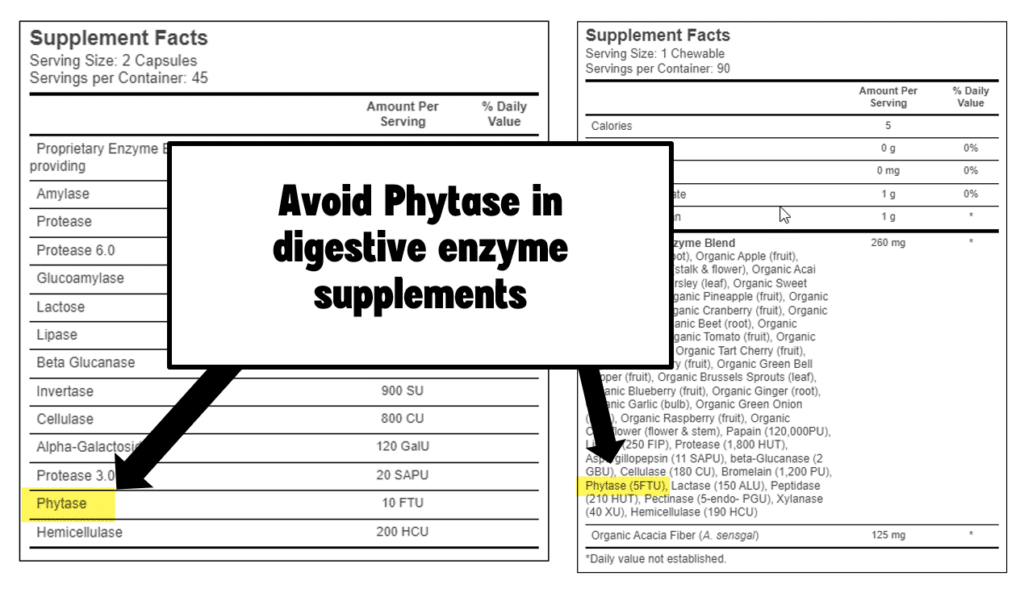What are digestive enzymes?
A digestive enzyme is a compound produced by your body to help break down the food that you eat into smaller molecules that your body can absorb. Many of these are made by your pancreas and secreted into your small intestine.
This post may contain affiliate links through which we may earn a small commission to help keep this website free.
Common types of digestive enzymes include:
- Proteases: These enzymes break down proteins into smaller peptides and amino acids. Examples include pepsin, trypsin, and chymotrypsin.
- Lipases: Lipases break down fats (lipids) into fatty acids and glycerol. They are produced by the pancreas and also by cells lining the small intestine.
- Amylases: These enzymes break down complex carbohydrates (starches) into simpler sugars like glucose. Amylase is produced by the salivary glands in the mouth and by the pancreas.
Why do people take digestive enzymes?
There are a variety of reasons why someone might take a digestive enzyme.
For example, people who are lactose intolerant do not make enough of the enzyme lactase, so their body cannot digest lactose. After eating dairy foods, these individuals will experience gas, bloating, abdominal cramping, and possibly diarrhea. Taking an enzyme that contains lactase can help with digesting foods that contain lactose such as milk and other dairy foods.
Similarly, some people do not tolerate foods that contain the complex carbohydrate raffinose. Raffinose is found in several kidney friendly foods such as beans, broccoli, and cabbage. If you experience excessive gas and bloating after eating these foods, you may benefit from taking a supplement that contains the enzyme alpha-galactosidase. This enzyme will help your body break down raffinose.
There are also some people who suffer from pancreatic insufficiency or other problems such as acute pancreatitis that can cause your pancreas to release less enzymes. People with diabetes are at increased risk of developing pancreatic insufficiency. Since diabetes is a common cause of chronic kidney disease, it is not uncommon for people with CKD to also have pancreatic insufficiency.
Symptoms of pancreatic insufficiency
People who have mild pancreatic insufficiency may not have any symptoms at all, or may just have occasional stomach discomfort and bloating. People with severe pancreatic insufficiency will typically have what is called steatorrhea, which is a fancy word for loose, greasy, smelly bowel movements. The deficiency of enzymes to break down fat means that the fat passes right through people and ends up in their bowel movements, making them appear greasy.
Should people with kidney disease take digestive enzymes?
Certain digestive enzymes can actually be harmful to people with kidney disease. You should talk to your doctor or dietitian if you experience any digestive discomfort such as gas, bloating, abdominal pain, or diarrhea when you eat. They can help recommend any additional testing that you may need to determine the right intervention, which may or may not include a digestive enzyme. Because the symptoms are so generic and can overlap with many other issues including food allergies, food intolerances, IBS, etc, it is difficult to generalize whether or not a person may benefit from a digestive enzyme.
For example, many of the unpleasant symptoms that people are trying to address when they choose to take a digestive enzyme may actually be due to an imbalance of good bacteria vs. bad bacteria in your large intestine and a probiotic may be a more beneficial supplement to take. Talk to your doctor or dietitian to determine what is right for your specific situation.
What to avoid: Phytase and CKD
People with kidney disease should avoid the digestive enzyme phytase. Consuming the enzyme phytase can increase your phosphorus levels.
Many kidney friendly foods such as beans, nuts, seeds and whole grains contain relatively high amounts of phosphorus. However, the phosphorus found in plant foods is bound to a compound called phytate. Humans lack the enzyme needed to digest phytate, so we are unable to absorb phosphorus that is bound to phytate. This essentially makes many of these foods low phosphorus foods, which is a good thing!
However, the enzyme phytase breaks down phytate. This results in phosphorus being released from these foods and absorbed into your blood stream. This can then cause your phosphorus levels to be elevated.

If you are taking a digestive enzyme, check to see if it contains phytase. If it does, you should find an alternative enzyme to take, even if your phosphorus levels appear normal. Many people with CKD consume too much phosphorus – especially in the form of additives – but phosphorus levels appear normal.
